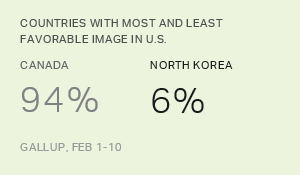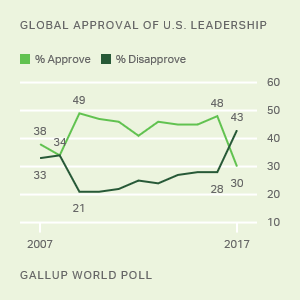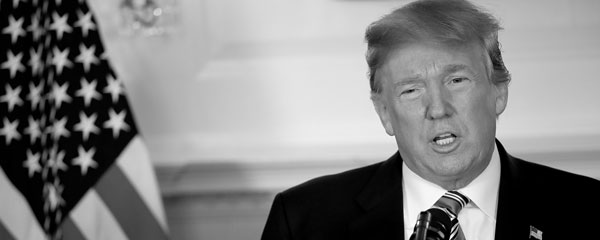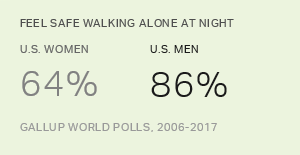The angry tweets and comments from President Donald Trump and his advisers after the recent G7 meeting in Quebec underscore the often-confrontational approach the Trump administration has taken toward the nation's major allies -- the United Kingdom, France, Germany, Japan, Italy and Canada.
But before the tweets and punditry, what do we know about the views of rank-and-file residents of these countries?
A review of available Gallup data underscores a massive attitudinal imbalance. Americans are very positive about their fellow G7 nations. Residents living in G7 nations, by contrast, have become very negative about U.S. leadership after Trump's election.
The data do not make for a perfect comparison. The latest update on American attitudes toward other countries comes from Gallup's annual World Affairs poll conducted in February 2018, a survey that did not include Italy as one of the countries ranked. The latest update on world attitudes toward the U.S. come from 2017, and -- importantly -- reflect a question that asks about U.S. leadership, not the nation as a whole.
Still, the contrast is notable. Well over eight in 10 Americans had a favorable opinion about the five G7 countries tested in Gallup's February survey this year: Canada, Great Britain, Japan, Germany and France. In fact, these five countries make up five of the six most positively evaluated countries on the overall list of 22 countries included in the survey (favorable views of Norway were fourth on the list, with 85% favorable opinion; Gallup last asked about Italy in February 2003, at which time 80% had a favorable opinion).
Canada, whose Prime Minister Justin Trudeau was called "weak" and "dishonest" by Trump, was at the top of the list of all countries rated this year, with 94% of Americans saying they had a favorable opinion of their neighbor to the north.
Americans' views of these countries have not always been uniformly positive, however. When France refused to support U.S. military intervention into Iraq in 2003, for example, Americans' positive views of that country were cut in half, to 34%, but recovered to their very positive levels within 10 years. Thus, while it is clear that Americans have extraordinarily positive views of each of these G7 nations prior to the recent summit, those views could change.
U.S. Image Was Damaged Among G7 Countries Before Summit
Even as Americans express positive admiration for the G7 nations, 2017 Gallup World Poll data show just how much the Trump administration's "America First" approach has already chilled the affection many residents of these nations felt for the U.S. under Barack Obama's leadership.
During Trump's first year as president, worldwide approval of U.S. leadership dropped to a record-low 30%, with some of the heaviest losses coming from some of the country's closest allies -- including the six other countries in the G7.
Nowhere was this shift more apparent than in its G7 neighbor to the north and current target of Trump's ire, Canada. On the heels of Trump's withdrawal from the Trans-Pacific Partnership and with the future of NAFTA hanging in the balance, Canadians' approval of U.S. leadership tumbled 40 percentage points from 60% in 2016 to 20% in 2017.
This is, however, similar to the previous low rating for the image of U.S. leadership on record in Canada -- 22% set back in 2008 under George W. Bush.
The pattern was the same among G7 partners in Europe. After the U.S. administration abandoned the Paris climate accord and raised questions about the U.S. commitment to NATO, ratings of U.S. leadership also dropped precipitously among longtime allies and G7 countries France (28 points), the United Kingdom (26 points), Germany (21 points) and Italy (14 points).
But even with these drops, it's important to note that none of the current lower U.S. leadership approval ratings in Europe is a new record low -- many ratings were similar if not worse during the last two years of the George W. Bush administration.
Although Japanese Prime Minister Shinzo Abe and Trump have met scores of times in person and over the phone -- and bonded over golf -- the Japanese public has become less enamored with the leadership of the U.S. Approval ratings dropped 16 percentage points in one year in Japan, with 31% approving of U.S. leadership at the time of the 2017 survey.
While not the lowest approval rating on record, for the first time since the latter years of the Bush administration, more Japanese disapprove (36%) of U.S. leadership than approve (31%).
All in all, it is clear that the alliances and partnerships that the U.S. has historically considered great strengths are evolving in an uneven environment -- one in which the average American has very positive views of the other nations involved, and the average citizens of those nations have quite negative opinions of U.S. leadership.
The big question is what this imbalance means for the future. In the post-World War II era, the U.S. has leaned on its many powerful partners to assist it in addressing issues beyond its borders time and again.
But, the large declines in the image of U.S. leadership among traditional allies could threaten the country's ability to mobilize its most reliable partners. While the current administration has argued that popularity matters less than doing what's right, trust is the currency of statecraft -- and it's hard to make good deals without it.





